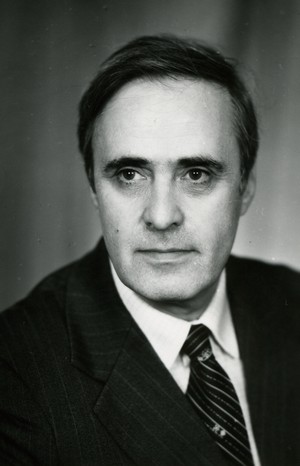Biography |
 Mikhail Shlemovich Birman was born on January 17, 1928 in Leningrad, USSR. His father was a professor, a specialist in theoretical mechanics. His mother was a school teacher.
Mikhail Shlemovich Birman was born on January 17, 1928 in Leningrad, USSR. His father was a professor, a specialist in theoretical mechanics. His mother was a school teacher.
M. Sh. Birman studied at the Mathematics and Mechanics faculty of the Leningrad State University in 1946-1950. He specialized in methods of computation. M.Sh. considered Mark Konstantinovich Gavurin, who had supervised his M.Sc., and Leonid Vitalievich Kantorovich to be his teachers. Already in his student years M. Sh. worked part-time at the Leningrad branch of the Mathematics institute, in the laboratory headed by Kantorovich. He was the best student of his year, possessing high intellectual level and independence of thought. Nevertheless, he was not admitted to the PhD programme as a result of the state policy of antisemitism.
In 1947, Mikhail Shlemovich married Tatiana Petrovna Il'ina, a student of the same year. In 1948, their son Zhenya was born. Together with Tatiana Petrovna, they lived happily throughout their entire lives. She passed away two years prior to her husband. She had always been his guardian-angel. Thanks to her love and care, he could dedicate himself to the cause of mathematics.
After graduating, M. Sh. worked at the Leningrad Mining institute as an assistant professor at the Dept. of Pure Mathematics. In 1954, he successfully defended his PhD thesis.
A major role in formation of M. Sh. as a mathematician was played by his active participation in the proceedings of the Leningrad Mathematical Physics Seminar, organized in the beginning of the 50s by Vladimir Ivanovich Smirnov. Later he headed this seminar for many years together with Olga Alexandrovna Ladyzhenskaya.
Folowing the advice by Vladimir Ivanovich and Olga Alexandrovna, in 1956 Mikhail Shlemovich took a position at the Leningrad State University, at the Dept. of Mathematical Physics of the Faculty of Physics. He worked at this department till the end of his life, for over 50 years. In 1962, he defended his D.Sc. thesis entitled "The spectra of singular boundary value problems". He was a brilliant lecturer and one of the leaders of the department, not just scientifically. Not only he earned a great professional authority, but also he paid highest attention to the people. Many of his younger colleagues enjoyed his influence as both a great professional and a wise man. His professional standards were always immensely high, not only for the quality of results but also for their presentation. And first and foremost, he adhered to these standards himself.
Together with his collaborator Mikhail Zaharovich Solomyak, Mikhail Shlemovich created a strong scientific school on spectral theory of linear operators, which has gained wide recognition in the world. Many of his former students have themselves become well-known scientists and now work at the leading universities of Russia and the West.
Mikhail Shlemovich Birman is an author of 3 monographs and more than 160 research papers. He paid significant attention to the editorial activities, was a member of the editorial boards of "Algebra and Analysis" (translated as "St.Petersburg Math. J.") and "Functional Analysis and Its Applications".
His merits were marked by the titles "Distinguished scientist of the Russian Federation", "Honorary professor of St.Petersburg State University". In 2008, he received an award from the government of St.Petersburg and the St.Petersburg Centre of the Russian Academy of Sciences - a honorary P.L. Chebyshev medal.
The works by M. Sh. Birman have gained high recognition and are widely cited in the mathematical literature world-wide. On many occasions he was an invited speaker at international conferences. He was frequently invited for scientific visits by the leading universities and scientific centres of the world.
The main scientific results of M. Sh. Birman are in the following areas:
- Computational questions in the problems of linear algebra (1950-52).
- Extensions theory. Elliptic boundary value problems (1953-62).
- Mathematical scattering theory (1960s).
- Spectral shift function.
- Double operator integrals (1965-73).
- The method of piecewise-polynomial approximations and its applications (1960s, 1970s).
- The Maxwell operator in non-smooth domains.
- Estimates and asymptotics of the negative discrete spectum and the spectrum in the gaps of the Schrodinger operator (1988-2004).
- The problem of absolute continuity of the spectra of periodic differential operators (1997-2004).
- New spectral approach towards homogenization of periodic differential operators (2000-09).